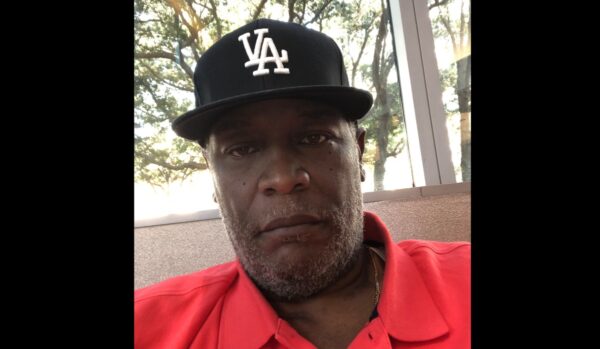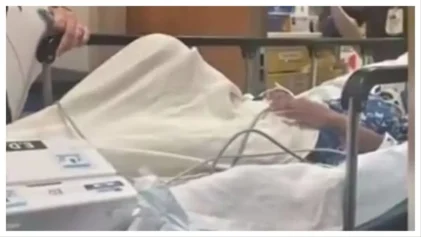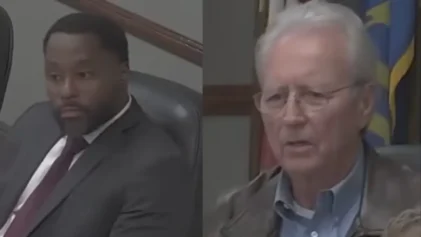A Florida jail could face legal action after staffers neglected to give an inmate medicine that could have saved his life.
Dexter Barry, 54, was locked up on Nov. 18, 2022, in the Duval County Jail on a misdemeanor. His family believes their loved one was not cared for properly over the weekend he was behind bars.
The former Jacksonville resident was charged with simple assault for allegedly verbally threatening his neighbor during a dispute.

“I take rejection meds for my heart transplant. I can’t miss those doses,” Body camera video shows Barry telling the arresting officer.
Reports show Barry and his neighbor were sharing Wi-Fi, but at some point, the neighbor stopped paying his share of the bill, Barry’s son Dexter Barry Jr. told The Tributary news outlet. Barry told his neighbor he was going to beat him up if he did not pay what he owed.
The neighbor called police. Jacksonville Sheriff’s Officer Jacob McKeon responded, and after reviewing the situation, he told Barry, “It’s just going to be to separate you all for a cool-off period,” and arrested him.
Barry told McKeon then and there about his heart condition and that it was vital for him to take his heart medication. Barry explained to McKeon that he’d had recently had a heart transplant and he needed to take his prescription for Mycophenolate, an immunosuppressant, to ensure his body did not reject the new organ. Barry would repeat this to jail officials.
Barry was diagnosed with congestive heart failure in 2008 and was on the waiting list for a new heart for 12 years. Black people in need of organ transplants can wait longer than other races to find donors, reports show.
“When I say, like, hurdles, he went through a lot just to get where he was. He was a fighter. He wasn’t going to give up. He just fought and fought and fought,” said Dexter Barry Jr. said to First Coast News.
Police body camera video captures him talking about the expensive surgery.
“My surgery cost me $4 million,” he said as they transported him to the local jail. “I had a heart pump first, and I had a transplant.”
Barry mentioned the importance of his medicine a total of seven times on the bodycam.
When Barry went before the judge for a hearing on his case, he told them that he had been deprived of his medication.
Court records show he told the judge, “I am on medication. I just had a heart transplant, and I haven’t took my medicine all day since I have been locked up, and I take rejection medicines for my heart so my heart won’t reject it, and I am almost two years out.”
He then told the judge that a 30-day prescription was costly, running him about $2,400.
Even with Barry explaining how important it was for him to receive his medicine on time, the jailers never administered it to him, and days after he was released, he died.
WSAZ reports Barry was bonded out of jail on Nov. 20. The next day, he was taken to the hospital by his loved ones. He died three days later on Thanksgiving day.
His death certificate states his heart stopped. The family argues his death is a direct result of not getting the medication he needed, News 4 JAX reports.
The Jacksonville Sheriff’s Office confirmed that the Duval County staffers knew about the prescriptions and still did not give them to him. Duval County Jail records show once Barry was booked, he had a medical screening that noted all of his medicines and his recent heart transplant.
The medical log stated his case was “urgent” and all the medicine he was to receive. It recorded that he received medicine for lesser health concerns but showed no one gave him the pills he needed most.
“How do you give him blood pressure and cholesterol meds but don’t give him the most important meds of all? That’s my only question. And we all know now that my dad’s rejection meds were the most expensive meds he took. So, all this can be about is money,” asked Barry’s daughter, Janelle King.
Experts at Duke Transplant Center state that should a recent transplant recipient stop anti-rejection medications the heart will respond very quickly and cause a permanent decline in the organ’s function and/ or death.
The family, his widow and their four children have now hired a lawyer, Attorney Andre Bonderud, to represent them as seek answers. Bonderud said he pressured the sheriff’s office for five months to obtain public records that would show what medication Barry received while in custody. He said the sheriff’s office only released the records after he went to the press.
“I want to get answers because I think the City of Jacksonville, the people who live here, and the people who run the city need to be educated about exactly what’s going on at the jail,” the lawyer said.
The Jacksonville Sheriff’s Office has refused to comment because of its policy not to comment on pending litigation.


